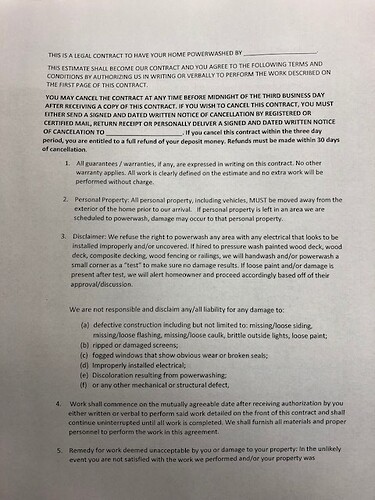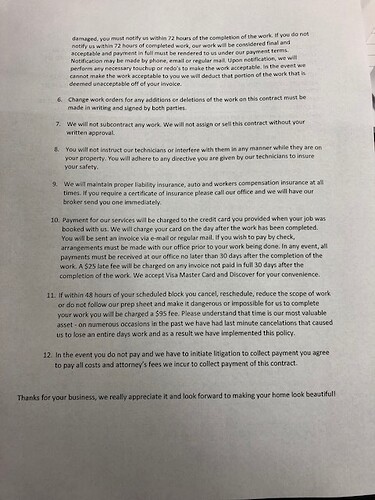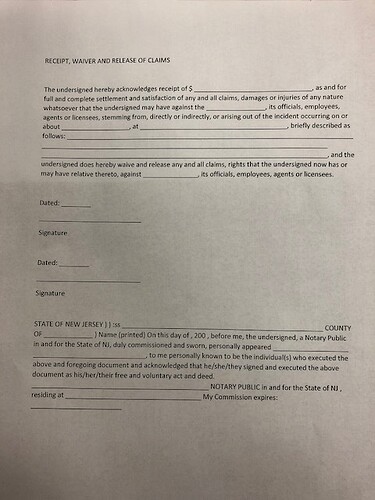Gentlemen, Ladies, Newbies, Oldbies, Middle-agedbies
As I mentioned like last week I’ve attached 2 documents (I CANT UPLOAD A PDF VERSION SO IT"S A PICTURE - IF YOU’D LIKE A COPY LET ME KNOW AND I’LL EMAIL IT)
(1) i’ve included the most important part of a Contract - The terms, conditions, and disclaimers portion. The first page, which i didn’t include, merely has the info any human powerwasher puts into their quote i.e. the price, property location, description of work, etc. The meat of a “Contract” is really the terms, conditions, and disclaimers. This is the disclaimers sections i’ve honed over time. It includes things I used in agreements for my own clients when I had my own private law practice as well as things i’ve picked up along the way operating as a business owner. (2) Release of liability form as it relates to #3 under my LEGAL TIPS AND TRICKS PORTION BELOW.
WITH THAT SAID PLEASE DO NOT COPY AND PASTE THE ATTACHMENT- This is specifically for New Jersey and may not hold up in a court of law for your particular home state if, unfortunately, you need to rely on it.
**THIS DOES NOT CREATE AN ATTORNEY-CLIENT RELATIONSHIP - By referencing and reading the attachment, it doesn’t make you my client and it sure as hell doesn’t make me your attorney. **
CONSULT YOUR OWN ATTORNEY - as you’ll see, this is probably overkill for what you need. It also may not be applicable for your particular locale - You may need something more low-key and condensed.
As i mentioned, i’m also including some legal tricks and tips which I advise newbies to read. Again these are legal tips i’ve implemented while practicing as an attorney as well as a business owner.
With all of this said, I hope i don’t come off like a know it all. I just feel like being an attorney, I may have some info that’s not easily accessible to the masses.
LEGAL TIPS AND TRICKS:
- Business Entity: As an attorney, it befuddled me how many contractors didn’t set up a legal business entity for their business; What that means is SET UP AN LLC OR CORPORATION FOR YOUR POWERWASHING BUSINESS! Go to your State’s website or google “create LLC + Alabama” and the state website should pop up. Mostly all states allow you to file an LLC online and can be done within 30 minutes for usually less than $300. Once you set up an LLC you can hire an attorney or search online for an “LLC Operating agreeement.” Which is the blood and guts of your LLC and governs how it operates. After you set up an LLC, you apply/get a Federal employer ID # which you can do online. Google FEIN and then go through the steps for setting up a new business. Obtaining a FEIN can be done, again, within 30-45min. Once you have these 2 things (LLC and FEIN) GO TO THE BANK AND OPEN A CHECKING ACCOUNT IN THE LLC’s NAME AND ONLY DEPOSIT YOUR BUSINESS INCOME INTO THAT ACCOUNT.
By creating an LLC and the LLC’s bank account it (1) protects your personal assets: If in the unhappy chance your business gets sued, the plaintiff (the person suing you) can generally only go after the LLC’s assets, not your personal assets (if you engaged in fraud or some other nasty stuff this protection is off the table). What does that mean? If you don’t have an LLC, the plaintiff can technically sue you, get a judgement and collect your personal monies i.e. personal bank accounts, titled in your name (house), etc. SET UP AN LLC OR CORPORATION AND BANK ACCOUNT!
-
Title everything in your business entity : Again, once you have an LLC or corporation, this should go without saying, but, title your work trucks, liability insurance, and any other work related assets in the businesses name - This way you can write off expenses (work truck payments, gas for truck and equipment, liability insurance premium payments, etc.) at the end of the year, and your personal liabilities are separate from your businesses.
-
Contract: When I was representing contractors, I made every single one of them get a signed contract from their client (whether it be a homeowner or a commercial client)- At first, almost every single one of them was nervous it would spook the homeowner/client. My response? who cares. Providing a contract to your client shows that (1) your professional; (2) you actually care about your work enough to get them a contract (3) allows you to sleep at night knowing your protected. For me personally, I have my Commercial clients ALWAYS sign a contract. Residential homeowners is really your call. Anything over $500 i usually have my residential clients sign, if it’s under $500 they have to atleast send me a confirmatory email saying they agree to the contract. Either way every single customer gets a Contract. I’ve found that If you’re dealing with a homeowner who doesn’t want to sign a contract or agree VIA email to a contract, chances are you’re dealing with a problem homeowner/customer who won’t pay you and/or will give you trouble. To date (knock on wood), every single one of my customers who has agreed to my contract has paid me.
My method is (a) verbal quote to the customer VIA phone, then (b) contract VIA email PDF attachment along with a copy of my certificate of insurance. I ALWAYS send my certificate of insurance - some call it unnecessary, but it’s a small act that has locked up customers. I can’t tell you the number of customers who have said in one way or the other “thanks for providing me the insurance certificate.”
- If you get sued : You accidentally used your xjet on a puppy’s face that belonged to your customer. After the homeowners has threatened you for a week you’ve been served with a Complaint filed by the homeowner. Take a deep breath knowing you have a business entity (LLC or Corp), insurance, and a Contract. Between those 3 things ( I like to refer to them as the holy trinity) you should rest assured that things won’t turn into a scorched earth situation. If served with a complaint, immediately pick up the phone and call your insurance company. They will assign your case to an attorney that represents your insurance comapny and you can sit back and let it take it’s course. Chances are you’ll have to answer some questions, fill out some paperwork, but MOST of the time it’s settled out of court (no trial) and the worse thing that happens is your insurance premium gets increased.
Alternate situation, you spray through and damage some siding by accident. You and the homeowner come to an agreement that you’ll pay for it. GET IT IN WRITING. Get something signed between the both of you outlining what happened (you broke stuff), you’re paying for it, and that both parties agree . This is called A RELEASE OF CLAIMS, and i’ve attached a copy.
- Don’t be an idiot : If you messed something up on the job, let the homeowner know about it. Don’t roll the dice hoping they don’t find out. Use your social skills and smooth things over on the spot. I can’t tell you how many legal battles i’ve been in as an attorney because my contractor client wasn’t honest and upfront with the homeowner when bad stuff went down. You broke something? Tell the homeowner. Not sure if you broke something? Tell the homeowner. Dont be an idiot.
I hope all this stuff helps and I haven’t come off as a goober. If there are any follow up questions, just let me know.




